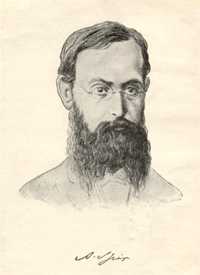Źródło: Words of a Sage : Selected thoughts of African Spir (1937), p. 60.
Afrikan Spir: Cytaty po angielsku
Źródło: Words of a Sage : Selected thoughts of African Spir (1937), p. 43.
“It depends on ourselves to be to each others, either a blessing or a torment.”
Źródło: Words of a Sage : Selected thoughts of African Spir (1937), p. 37.
"jouissance", Fr.
Źródło: Words of a Sage : Selected thoughts of African Spir (1937), p. 48 - Gandhi wrote something that is almost word for word the same, in All men are brothers.
Źródło: Words of a Sage : Selected thoughts of African Spir (1937), p. 50.
or collapse, or failed
Źródło: Words of a Sage : Selected thoughts of African Spir (1937), p. 41.
Źródło: Words of a Sage : Selected thoughts of African Spir (1937), p. 52.
Źródło: Words of a Sage : Selected thoughts of African Spir (1937), p. 38.
Źródło: Words of a Sage : Selected thoughts of African Spir (1937), p. 60.
Źródło: Words of a Sage : Selected thoughts of African Spir (1937), p. 38 ["… moral consciousness is an innate and intimate revelation of the absolute, which exceed every empirical data..." - see above].
Źródło: Words of a Sage : Selected thoughts of African Spir (1937), p. 45.
Źródło: Words of a Sage : Selected thoughts of African Spir (1937), p. 52.
Źródło: Words of a Sage : Selected thoughts of African Spir (1937), pp. 64-65 - end of parenthesis.
Źródło: Words of a Sage : Selected thoughts of African Spir (1937), p. 55.
Źródło: Words of a Sage : Selected thoughts of African Spir (1937), p. 43.
Źródło: Words of a Sage : Selected thoughts of African Spir (1937), p. 56.
Źródło: Words of a Sage : Selected thoughts of African Spir (1937), p. 54.
Źródło: Words of a Sage : Selected thoughts of African Spir (1937), p. 60.
Źródło: Words of a Sage : Selected thoughts of African Spir (1937), p. 51.
"Le concept de l'absolu, d'où découlent, dans le domaine moral, les lois ou normes morales, constitue, le principe d'identité, qui est la loi fondamentale de la pensée; il en découle les normes logiques qui régissent la pensée dans le domaine de la science."
Źródło: Words of a Sage : Selected thoughts of African Spir (1937), p. 59 [Hélène Claparède-Spir had underlined - the translator]
Źródło: Words of a Sage : Selected thoughts of African Spir (1937), p. 49.
Źródło: Words of a Sage : Selected thoughts of African Spir (1937), p. 61.
Źródło: Words of a Sage : Selected thoughts of African Spir (1937), p. 40.
Źródło: Words of a Sage : Selected thoughts of African Spir (1937), p. 48.
Źródło: Words of a Sage : Selected thoughts of African Spir (1937), p. 48.
Źródło: Words of a Sage : Selected thoughts of African Spir (1937), p. 42.
Źródło: Words of a Sage : Selected thoughts of African Spir (1937), p. 41.
Źródło: Words of a Sage : Selected thoughts of African Spir (1937), p. 51.
“The moral improvement demands an evolution leading to a higher consciousness”
Źródło: Words of a Sage : Selected thoughts of African Spir (1937), p. 60 - Hélène's Claparède-Spir underlined.
Źródło: Words of a Sage : Selected thoughts of African Spir (1937), p. 37.
